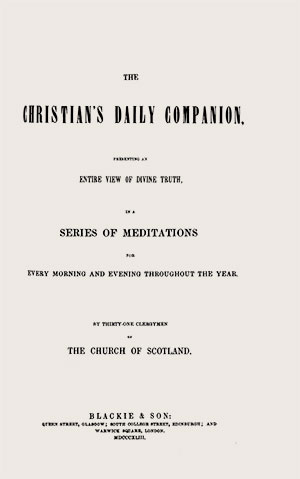Each of us is the chief of sinners

Title page of The Christian’s Daily Companion
Today's Devotional
The saying is trustworthy and deserving of full acceptance, that Christ Jesus came into the world to save sinners, of whom I am the foremost—1 Timothy 1:15 (ESV)
You wish to reform the world: reform yourself, otherwise your efforts will be in vain.—St. Ignatius of Loyola
So deep is the sense of sin in the enlightened convert, that knowing it in his own heart, as he cannot know it in any other, he is willing to regard himself as the chief of sinners. And if this was the state of the apostle Paul, who among the disciples of Jesus, stood, and stands, and will ever stand, pre-eminent for holiness, self-denial, and devotedness to his Master’s cause, how much more must it be the state of us, who can lay no claim whatever to his revelations, his peculiar privileges, and his direct communication with the Lord of glory, who in his sovereignty, and from eternity, had made him a chosen vessel unto himself, to bear his name before the Gentiles, and kings, and the children of Israel. How precious, because “faithful, then, is the saying,” that Christ Jesus came into the world to redeem the guilty, and how still more precious, because it is “worthy of all acceptation, that he was manifested in the flesh” to save me, who am the chief of sinners!
...Let us remember that the evil heart of unbelief, in all its modifications, is ruin. Let us pray fervently and perseveringly, that the Lord the Spirit may take every root of it entirely away; that we may taste and see that God is good, and be more and more established in the present truth, that it is indeed “a faithful saying and worthy of all acceptation, that Christ Jesus came into the world to save sinners,” of whom we feel that we are the chief. —Robert Jeffry
About the author and the source
The opening quote, encouraging personal holiness, is from the founder of the Jesuits, Ignatius of Loyola (1491–1556). This is followed by an excerpt from The Christian’s Daily Companion, a work of thirty-one contributors from the Church of Scotland, each of whom provided morning and evening meditations for the days assigned them. Today’s author, Robert Jeffry, was a minister in Girthon.
Ignatius of Loyola. “September 3rd” Thoughts and Counsels of the Saints for Every Day of the Year, collected by Rev. Bonaventure Hammer. n.d.
Robert Jeffry. “[September] Third Day—Evening,” in The Christian’s Daily Companion. Glasgow and Edinburgh: Blackie and Son, 1843.





